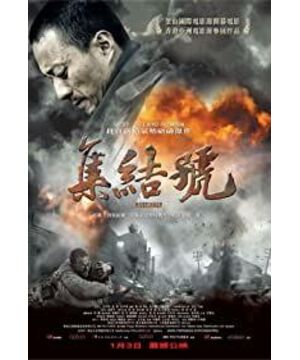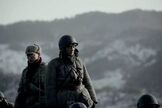When I saw the first quarter or so, I felt quite uncomfortable and almost got up and left the field.
In terms of film technology, the handling of the war scenes of the "Assembly Number", including shots, props, special effects, and actor performances, is approaching "Rescue Private Ryan" (Taiwan translated "Rescue Ryan Private") or "Brother Company" (Taiwan translation "Normandi Airborne") production level; Chinese film can have this technical achievement, it is worth celebrating. However, the film's plot arrangement for the war process has too many unreasonable points.
First of all, I don't understand, how could this reserve army, which was ordered to block the enemy's army and cover the transfer of large forces, be sent to defend a low-lying place? Is this ambiguity seeking a dead end? Why not guard the bridge across the Wen River? (Please refer to the last battle at the bridge in "Rescue Private Ryan")
Then, when the instructor wearing glasses was first introduced to the other brothers, the shell suddenly struck, and the sky was shaking. However, all veterans of the battlefield know that if they encounter shelling in open ground, they will first hear the sound of shells breaking through the air; and this sound alone can determine where the shells fall and whether they should hide or ignore them. It is unlikely that a situation like the one caught off guard in the movie will happen.
Then, the first attack by the Kuomintang army showed that a large number of infantrymen were densely packed, squeezing each other, and marching toward the enemy's position like ants. Aren't they afraid of being shot and killed ten by the opponent? Such a scene arrangement seems to be a phalanx in the cold weapon era, rather than a behavior that a modern army with rifle and long-range strike capabilities should have.
And when the Kuomintang army advanced to the front of the position and the two armies began to prepare to meet each other shortly, the artillery of the Kuomintang army actually launched an artillery bombardment on the enemy's position. Are they not afraid of accidentally hurting their own people? This is simply incredible! !
These obvious major mistakes revealed that the director's handling of the entire war scene was only to bombard the audience with uninterrupted sensory stimulation and sensational elements; and the reality of the war itself did not intend to be more serious and serious. Zhou Yan, profound design to face it. For viewers who have watched rigorous war films like "Rescue Private Ryan" and "Brothers Company", the war scenes of "Assemble Number" rather represent the world-wide retrogression of the creative attitude of Chinese films; this makes me very uncomfortable. Comfortable.
2.
However, what is worth paying attention to is not the retrogression of Chinese films.
As the film progresses, it becomes clearer and clearer that the director only cares about one thing, which is called "honor"; the opening scenes of the war are all stage backgrounds that must be arranged in order to lay out the final award-winning monument. For this reason, the major mistakes mentioned above are not the point at all for the director; the point is to ensure that there are enough stimulating and sensational images to allow the protagonist to give full play to his perseverance, bravery and brotherhood. This is the only way. He was able to obtain the final "honor."
This reminds me of Shi Mingde and the red shirts.
A year and a half ago, under the leadership of Shi Mingde, the Red Shirts had just launched the "One Hundred Yuan Suppression" campaign, which was quite powerful; friends would ask each other from time to time: "Have you donated?" But at the time I wrote this opinion:
"There is only one central idea of this type of movement: perseverance and non-violent means to overthrow the government. Apart from this, there is no other ideology. The presupposition behind it is After being overthrown, the imaginary "liberal democracy" (Messiah?) will come. Also because there is no further higher-level ideology and path diagram, physical collision and sacrifice-that is, like the presidential palace The perseverance of the former pacesetter became the only effective/final way out. It is no wonder that one hundred yuan is constantly trying to carry out Shi Mingde’s persevering hunger strike experience. (Don’t forget that Shi was born in a military school)
The URM of more than ten years ago greatly advanced the DPP on the road to governance. Ten years later, the 100 yuan collapsed, using the same method. And we can’t see the ideology, only the perseverance. What about Taiwan’s prospects and self-positioning after the downfall of Bian? What profound lessons have been taught Taiwan after sending Bian to power? What kind of wisdom can be extracted from this process? Or is it still the same as imagining that after the downfall? A Messiah will come automatically? (Is this a mirror image of Luzhi's optimism in the heart of the baby boom generation since the Uztak-Anti-Vietnam War-Village Voice-Computer Civilization is attached to the American-dominated Western subculture? ) Under perseverance, these are ignored.
So this is the poverty of thought . This is the case more than ten years ago, and it is still the same more than ten years later. Do you think I will not feel deep sorrow?"
Over the years, Shi Mingde has often emphasized his image of courage, defying power and death threats, and having been in prison for many years. The entire red shirt movement is based on the maintenance and renewal of this "honour of one person." As for the current real resistance and rebellion, it is actually not that important anymore. Therefore, there will be a Fan Keqin with a background in advertising to dominate the operation strategy of the movement. With the help of the media, the "honour of one person" has been visualized, symbolized, sensationalized, and continuously expanded, and then finally bubbled this year.
But in addition to perseverance, what did Shi Mingde do after he was released from prison on the three virtues of "standing meritorious deeds"? Has he ever put forward a specific development vision and constructive approach like his old comrade-in-arms Xu Xinliang did? No one asked seriously. As a result, the "hundred-dollar downfall" will eventually become a emptiness, and it will become the unbearable pain of some red shirts who donated money in the first place. In fact, there is good reason.
What the "Assembly Number" presents, to me, is the synonymous repetition of the Red Shirt Army's "100 yuan down flat". Has the trumpet sounded, has it been heard, has it been effective? It doesn’t matter at all (just like whether the war scenes are authentic and credible, it’s not at all important); what’s important is that compared to Taiwan that year, the visualized and symbolized "honor of one person" gathered 100 million Taiwan dollars. How many box-office results can the "another person's honor", which is also visualized and symbolized in mainland China this year, be collected for sports funding?
The box office of the film broke 70 million yuan in the first weekend; friends asked each other: "Have you watched it?" CCTV News Network even broadcast its box office news. There was a lot of praise from all walks of life, and many viewers were really moved to tears. These numerous phenomena are just like the state during the climax of the Red Shirts movement last year.
From the climax of the Red Shirts to the "Assembly Number", the two popular phenomena that are separated by one year and belong to the political and film categories have coincidentally revealed a certain common collective subconsciousness of the current Chinese on both sides of the strait? And Yin Jian, who finally became a bubble in the Red Shirts movement, is not far away. Then, what about the phenomenon of "Assembly Numbers"? According to the newspaper, the director intends to shoot the three major battles next (estimated to coincide with the 60th anniversary of the Liberation War). Hearing this news, should he be happy or worried?
three,
After watching the movie, I went to the bookstore downstairs at the Beijing Film Association Cinema. Not long after I walked in, I saw the memoir of Company E Company Captain Winters's "Brother Company" on the shelf. I bought it without saying a word.
Going home and flipping through it casually, I saw two things that made me think deeply. Among them, Winters recalled that in January 1945, after the tragic Battle of the Bulge, Company E moved to Alsace with the regiment to replace the heavily injured 313 Infantry Division. Among their German opponents was Hans. Feng. Lieutenant Colonel Luke is brave and good at fighting; after defeating the Allied forces in a certain battle, he asked his men to play Baja's "Thank God for everything" in a church, and everyone who heard it wept in tears.
46 years later, the war has long since ceased. Winters revisited this church, along with his rival Luke; in the church, they played "Thank God for everything."
Such scenes have always moved me deeply. After surviving for many years, the two players who had struggled to death have returned to the old battlefield hand in hand when they were gray-haired, paying tribute to each other with music. It was an chant of life and destiny, and stretched out wrinkled palms to soothe each other's trauma. In the past ten years, with various activities to commemorate World War II, I have heard such stories from time to time.
The humanities scholar Lin Gufang once used "divinity and sentiment" to give a foothold to the ultimate care and core values of Chinese culture. Different from Western abstract rational thinking aesthetics (for example, Bach’s music), Chinese people prefer the humanity of entering the world, and Lin Gufang further pointed out:
"This kind of humanity is sometimes biased towards reality. Therefore, in order to make it possess The profoundness and openness of the ultimate concern, the Chinese are "leap into history with a poetic heart", in the "contemplation of history, the exclamation of poetry", they have the same voice and breath with history... People are connected to history and the surrounding sentiment , Is to be able to face life, but to be able to realize the ultimate meaning of life is the compassion between the sentient beings" (Lin Gufang, "The Song of Life")
For me, nearly half a century after the end of the war, Major Winters and Lieutenant Colonel Luke reunited in Baja’s music, expressing this "compassion between affection." In this space-time scene, the compassion caused by the "feeling" and its "between" exist in the two creations of the enemy and ourselves, in the living and the dead, in the church that was the battlefield in the past and the church that is the place of confession in the present; It also exists in the audience as a member of the world of Saha, and Baha's music as abstract rational transcendence thinking, between the two. Everyone and everything in it has its life, its story, and its confession. "Knowing the ancient meaning of the river, there is true affection everywhere in the world." As the ultimate care of human beings, it is also to listen to, visualize, and chew the true love stories contained in the various realistic landscapes along the way in life, and tolerate it with compassion. , Resolve it.
Only with such a broad, far-reaching, and compassionate mind and vision, can they provide a transcendent comfort and resettlement to the tearing and destruction caused by the war years later. Otherwise, the ghost that lingers on the battlefield, no matter if it was an enemy or a friend at the beginning, how can it rest in peace, and how can it no longer be reincarnation as the wraith that triggers the next war?
Sun Tzu's Art of War said: "Soldiers, the important affairs of the country, the place of death and life, and the way of survival and death, must be observed." Such a cautious attitude is not only what the leading generals or soldiers should pursue; even afterwards, it is based on culture and art. Creators who reproduce war scenes and history in a form must also be cautious. In particular, the creators or interpreters of later generations have different positions and opinions, and may even have different information and expression tools.
At the beginning of the 21st century, we saw that the United States had "rescue soldier Ryan" and The appearance of "Brother Company". As Hollywood blockbusters, both have the ideology of Great Americanism as the basis, but their penetrating power and appeal still make many viewers of different nationalities unable to control themselves for a long time. Undoubtedly, this depends on the film creation group maintaining a respectful attitude towards the macro and micro aspects of the war and historical process. And this attitude is not only manifested in the exegetical level of props, costumes, special effects, scenes, etc., but also in the character setting, plot, psychological changes, and interpretation of the position of the enemy and ourselves.
Another thing that made me think about the "Company of Brothers" is that the story of "The Company of Brothers" is based on a large number of personal interviews and field surveys, especially the memories of many grassroots non-commissioned officers and soldiers; and then extracts the truth from the truth. The power of drama across the human gap. More than half a century has passed since the civil war between the Kuomintang and the Communist Party. In addition to the memories of the generals, how many true memories of non-commissioned officers and soldiers have been unearthed? How many "Major Winters" and "Lieutenant Colonel Luke" of the KMT and the Communist Party can work hand in hand in their own music while they are gray-haired, and touch each other's breasts again? Let’s talk about the "dimension and sentiment"?
It is said that this is the era of China’s peaceful rise, and the "Assembly Number" only catches up with Hollywood’s hundreds of millions of production funding in terms of technology, but in terms of perspective and vision, it has not shown transcendence. The ambition of world-class war films has even gone backwards. In the past few years, there have been so-called blockbuster films with first-class technology and lack of perspective; this is actually a cultural waste under the influence of the Great American ideology. Many scholars and experts have said that the rise of China cannot be based on American-style modernization and wasteful consumption, otherwise the material and mind of the entire world will not be able to bear it. As a big country with a high degree of self-expectation, it should have a more transcendental thinking about the practical prospects of cultural creation, instead of staying under the framework of the endless industrial production in the last century and playing on its own.
Therefore, as a witness and participant of the rise of China, I have seen such a film receive so much applause, thinking about the status and prospects of Chinese cultural soft power in the world, can I not stop myself?
View more about Ji jie hao reviews











